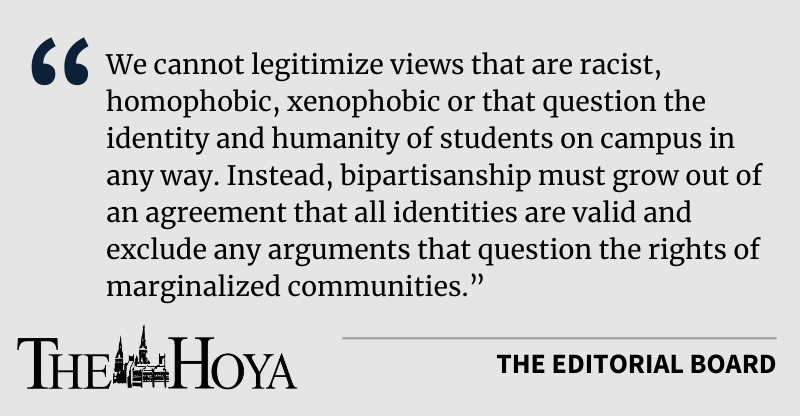No student or community member on Georgetown University’s campus or elsewhere should ever feel like they have to entertain political arguments that deny them their humanity or rights. Open-mindedness and civility in political discussion are always important, but no student should face arguments that their identity is invalid or undeserving of basic rights.
The Trump administration has been an example of larger issues of polarization throughout the United States and has not actively worked to foster bipartisanship. The Biden administration is showing promise for facilitating bipartisanship in the federal government. As media outlets call the presidential election for Joe Biden, we must work to build bipartisanship on campus but also actively reject all forms of dehumanization. While Biden’s election does not mean bipartisanship has been suddenly perfected in the United States, it is certainly a step in the right direction. As the Georgetown community awaits Biden’s inauguration, we must join him in beginning the process of improving the meaning of bipartisanship within our community.
On a college campus, however, bipartisanship is not about compromising to efficiently pass legislation, as it often is in state and federal governments. Rather, bipartisan attitudes allow students to engage with diverse ideas and critically examine their own biases. Therefore, across-the-aisle discussions must always come with a baseline rule: The identities and rights of people must never be called into question or denied.
Marginalized communities do not have the option of viewing politics as impersonal. While bolstering every person’s equality and rights should transcend party politics, respecting every person’s identity and humanity has become a partisan issue. We must push back on this trend.
Bipartisanship is an essential component of U.S. democracy. Without negotiation and compromise, policies rarely come to fruition. Yet, regardless of party, no student, professor or politician should compromise on recognizing marginalized people’s humanity and advancing their rights.
Student organizations should never ask members of marginalized groups to debate issues that pertain to their humanity in the name of facilitating bipartisanship. Viewing all politics as a debate topic rather than something that can severely determine your livelihood is an immense privilege. As a political community on campus, we must recognize this reality. These changes include ensuring organizations do not facilitate events that call students’ humanity into question and establishing unequivocal dedication to respecting all identities.
Our community must recognize that racism, sexism, homophobia and transphobia — among all other forms of discrimination — are not part of and should never be included in healthy political discourse that challenges students to think critically while maintaining an expectation of respect.
The community must reevaluate the meaning of bipartisanship before we can move forward. For across-the-aisle discussions to function effectively on Georgetown’s campus, all political organizations must condemn any policies or ideas that reject the humanity of many students. Topics such as LGBTQ marriage, the Trump administration’s decision to deny transgender Americans entry into the military and the Black Lives Matter movement should not be partisan; they are a matter of human rights.
Furthermore, no community of students on campus should be asked to compromise on issues of their identity to foster bipartisanship. While it is certainly commendable that some students from marginalized groups choose to facilitate political conversations with those who challenge their rights, no one should ever feel as though they have to unjustly expend the emotional labor to make this compromise in the name of bipartisanship.
Political organizations on campus, both student and faculty-led, have outlined their vision for bipartisanship on campus. This plan includes respecting others and encouraging civility, which is key to the goal of bipartisanship on campus.
Bipartisanship is based on shared values of respect and civility, Ajayan Williamson (COL ’21), chair of the Georgetown University College Democrats, wrote in an email to The Hoya.
Williamson also explained that GUCD believes calling out hatred and discrimination is important no matter what party is perpetuating it.
“The College Republicans have largely been silent as the President spent the past four years undermining our institutions, and they are silent now as he refuses to concede and undermines our democracy in the process,” Williamson wrote. “Silence in the face of attacks on ostensibly shared values is simply an abject failure on the part of the College Republicans, and it is actively harmful to bipartisanship on campus.”
The Georgetown University College Republicans declined to comment for this article.
Nonpartisan organizations designed to foster critical conversations, such as the Philodemic Society, also say bipartisanship and cross-party discussions are exceedingly important and must be civil, while still respecting individual rights and liberties.
“We believe it is important that we always be civil with those with whom we disagree because that is the only way we can further develop our own ideals. However, the Philodemic Society also acknowledges that an essential prerequisite of bipartisanship is the good faith of all parties,” Philodemic Society President Cailee King (SFS ’21) wrote in an email to The Hoya.
Bipartisanship on Georgetown’s campus cannot be focused on accepting the views of all students. We cannot legitimize views that are racist, homophobic, xenophobic or that question the identity and humanity of students on campus in any way. Instead, bipartisanship must grow out of an agreement that all identities are valid and exclude any arguments that question the rights of marginalized communities.
We are a community of students who must uplift and support one another. Students must work to ensure bipartisanship is conditional upon respect for people’s humanity and identity above all else, especially as we move forward from this election.
The Hoya’s editorial board is composed of six students and is chaired by the opinion editor. Editorials reflect only the beliefs of a majority of the board and are not representative of The Hoya or any individual member of the board.










Doug • Dec 24, 2020 at 9:38 pm
Well bless your heart.
Clay • Nov 19, 2020 at 8:54 pm
Very bipartisan of you. It ain’t bipartisan if you don’t agree with it. Very cool.